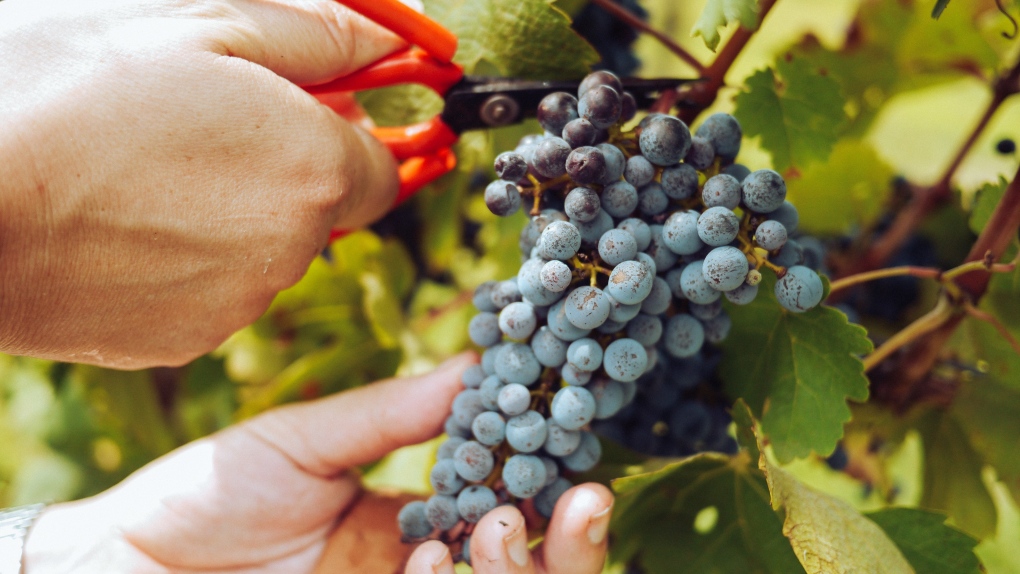
Quebec nurse had to clean up after husband's death in Montreal hospital
On a night she should have been mourning, a nurse from Quebec's Laurentians region says she was forced to clean up her husband after he died at a hospital in Montreal.
The grape is beloved around the world as a food and beverage staple that offers a lot of nutritional benefits, and new research suggests there might be another reason to love it: sunburn protection.
A small, peer-reviewed study published Wednesday in the scientific journal Antioxidants found that consuming grapes protected against ultraviolet (UV) skin damage in a group of 29 human volunteers.
Researchers from universities in Massachusetts and New York monitored the volunteers as they consumed whole grape powder – equivalent to 2 ¼ cups of grapes – each day for two weeks. They measured subjects' skin response to UV radiation before and after eating the grapes, and found that, by the end of the study, one-third of the subjects showed increased resistance to sunburn. The authors said that resistance was likely linked to polyphenols, naturally-occurring compounds found in grapes that work as antioxidants in the body.
Analysis of gut microbiome, blood, and urine samples showed the same subjects who demonstrated UV resistance also had unique microbiome and metabolic characteristics that the researchers said suggested a link between people's genes, their gut health and their skin health. In other words, some people's genetic profiles include digestive and metabolic traits that allow them to enjoy resistance to sunburns after eating grapes.
"'Let thy food be thy medicine and medicine be thy food' dates back to the time of Hippocrates," John Pezzuto, the study's lead author and dean at Western New England University, said in a media release. "Now, after 2,500 years, as exemplified by this human study conducted with dietary grapes, we are still learning the reality of this statement."
The report adds to a growing body of scientific evidence that eating grapes can help protect skin against UV radiation. It cites American studies from 2008, 2019 and 2020 that found eating grapes helped prevent skin cancer in hairless mice exposed to UV lights.
UV light is the component of sunlight that ages and damages skin and can cause cancers like melanoma. According to the Nov. 30 study, most skin cancer cases are associated with exposure to UV radiation from the sun.
According to the Canadian Skin Cancer Foundation, more than 80,000 cases of skin cancer are diagnosed in Canada each year. More than 5,000 of those cases are melanoma, the deadliest form of skin cancer.

On a night she should have been mourning, a nurse from Quebec's Laurentians region says she was forced to clean up her husband after he died at a hospital in Montreal.
A North Bay, Ont., lawyer who abandoned 15 clients – many of them child protection cases – has lost his licence to practise law.
Members of the Bank of Canada's governing council were split on how long the central bank should wait before it starts cutting interest rates when they met earlier this month.
Brad Marchand scored twice, including the winner in the third period, and added an assist as the Boston Bruins downed the Toronto Maple Leafs 4-2 to take a 2-1 lead in their first-round playoff series Wednesday
Cuba's foreign affairs minister has apologized to a Montreal-area family after they were sent the wrong body following the death of a loved one.
Mounties in Nanaimo, B.C., say two late-night revellers are lucky their allegedly drunken antics weren't reported to police after security cameras captured the men trying to steal a heavy sign from a downtown business.
The federal government's proposed change to capital gains taxation is expected to increase taxes on investments and mainly affect wealthy Canadians and businesses. Here's what you need to know about the move.
Canada's Deputy Prime Minister Chrystia Freeland was among the 1,700 delegates attending the two-day First Nations Major Projects Coalition (FNMPC) conference that concluded Tuesday in Toronto.
The daughter of a New Brunswick man recently exonerated from murder, is remembering her father as somebody who, despite a wrongful conviction, never became bitter or angry.

A property tax bill is perplexing a small townhouse community in Fergus, Ont.
When identical twin sisters Kim and Michelle Krezonoski were invited to compete against some of the world’s most elite female runners at last week’s Boston Marathon, they were in disbelief.
The giant stone statues guarding the Lions Gate Bridge have been dressed in custom Vancouver Canucks jerseys as the NHL playoffs get underway.
A local Oilers fan is hoping to see his team cut through the postseason, so he can cut his hair.
A family from Laval, Que. is looking for answers... and their father's body. He died on vacation in Cuba and authorities sent someone else's body back to Canada.
A former educational assistant is calling attention to the rising violence in Alberta's classrooms.
The federal government says its plan to increase taxes on capital gains is aimed at wealthy Canadians to achieve “tax fairness.”
At 6'8" and 350 pounds, there is nothing typical about UBC offensive lineman Giovanni Manu, who was born in Tonga and went to high school in Pitt Meadows.
Kevin the cat has been reunited with his family after enduring a harrowing three-day ordeal while lost at Toronto Pearson International Airport earlier this week.
 (Pexels / Grape Things)
(Pexels / Grape Things)